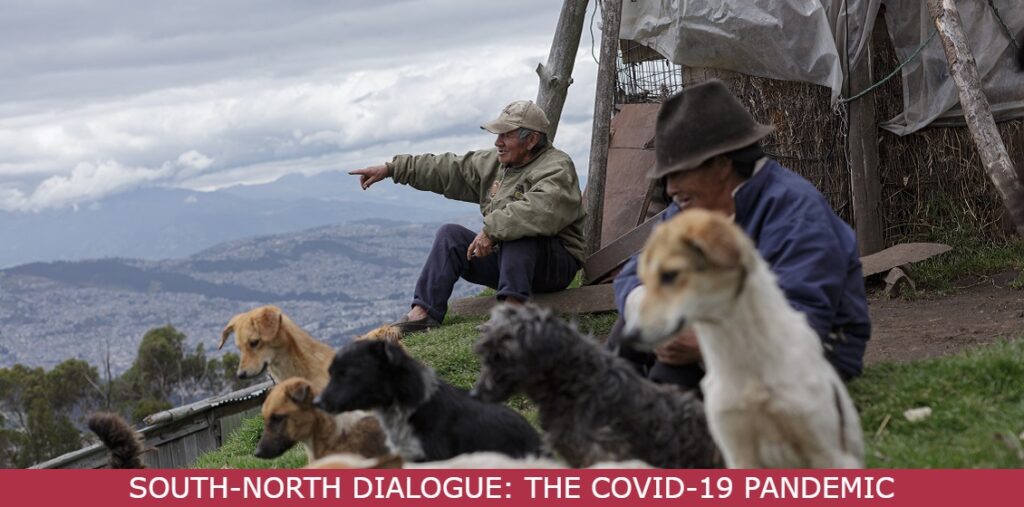Seeing the capital from up here, in the hills high above the rooftops, our perspective changes. The distance is small, but mentally, this is another world. We’re in the neighbourhood of El Pilar – in the outskirts of Quito, high in the green mountains that surround the city. People in this area are traditionally farmers, and now, most of them are elderly.
José Antonio Cayancela Vargas (75), lives here with his sister Rosa Cayancela (73) and his seventeen dogs. They have spent the pandemic with each other in their home in the El Pilar neighborhood, on the outskirts of Quito. Quito-Ecuador. A world with no mobile phone coverage. With no internet. A high place where the pandemic doesn’t seem to have reached. He suffers from some stressful mental health issues.
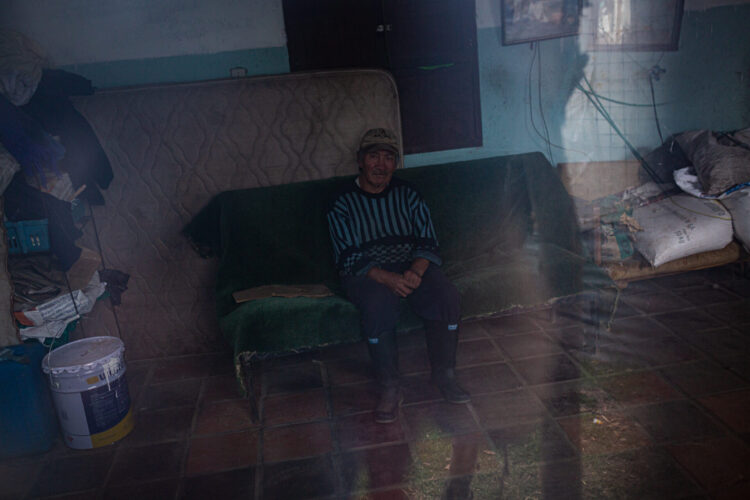
In earlier days he worked on the farms. The area produces potatoes, barley, and lima beans. Some time ago he began suffering from varicosed legs, so he has trouble walking, and being able to do work. ”The effect of my illness and my age has been crushing,” says José Antonio, surrounded by his pack of loving dogs. “But isn’t the scenery beautiful?” he asks, pointing down at the city.
The only way to reach El Pilar is on foot. It can take up to two hours, depending on your pace, and your health. José Antonio recalls the arrival of COVID-19 to Ecuador in early 2020. ”Then this pandemic appeared. I don’t know why. Apparently, it came to enslave us. To dominate us, the poor. What do I know?” Meanwhile, during March and April 2020 the Ecuadorian coastal city of Guayaquil became the Latin-American epicentre of the pandemic. Pictures of unburied bodies lying in the streets circulated worldwide. But this green mountain spot, high above Quito, has been a safe haven. ”Luckily the pandemic did not reach us here,” says José Antonio. “It was worrying. I thought that maybe I would get infected. And what about us who live alone? But thank God that hasn’t happened. And now we have been vaccinated,” says José Antonio.
For him the pandemic represents hard economic consequences for the poorest: ”The poor are out of work. Companies fired their workers without compensation or anything. So – I think it’s a pretext to rob folk of their jobs, and leave them in poverty. This has happened not only here in Ecuador, but also all over the world. I think that some rich businessman invented this for his own convenience.” He sits on the grass, with his seventeen dogs, looking down over the city of Quito, that seems so quiet from up here.
And José Antonio and his family do know all about poverty. He was born in a hacienda, where his parents worked their whole life as serfs, modern slaves. When he was six his father died, and José Antonio came to live here with his elder siblings.
The “mayor” of the neighbourhood, Mery Torres, has been gathering donations for this area’s inhabitants during the pandemic. Today a small group of volunteers from the posh district of nearby Cumbaya have made it up, doling out food for José Antonio and his neighbours. They have been doing so every second week for quite some time now. “So that the elderly people should not risk leaving home,” Mery Torres explains, “Going out for food, or for work. Because down there in Quito, things are quite tough, and many people died. We could not let them take that risk.”
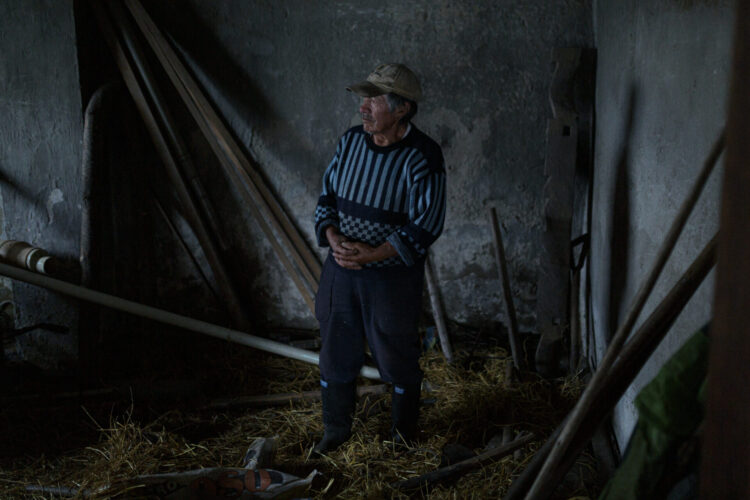
We return to José Antonio. When asked about what worries him he explains that other things have priorities.“We have been living our whole lives here, and the authorities have forgotten about us up in these farming areas. For starters, building a road to reach us, just to get our produce down.”
So, for now, José Antonio and his neighbours can only walk down to the city. An endeavour, that takes this seventy five year old, with his tired varicosed legs, a couple of hours. “And if there are any emergencies, pandemic-related or not, no ambulance can get here.”
“If something happens to someone, hard luck. They would just die, as there is no road, and no way to call an ambulance! But with a road, yes, the ambulance could come,” says José Antonio, simply.
And then there is the problem with communications. In Ecuador, according to Ecuador’s National Statistics Institute, by 2019, over 45% of households nationwide had Internet access. However, people aged 65 and older represent only 18% of users who have a smartphone. José Antonio shows us his “smartphone”. “It stopped working some two years ago,” he tells me. Anyway, he wasn’t familiar with using it for the internet. “And there is hardly any mobile coverage up here in El Pilar.” “It is a bit difficult with all communication around here. And this internet thing? – It’s mostly for the young people”.
On the back of José Antonios phone is a sticker with his number written on it. He shows an old Nokia too – but the line for it has apparently been cancelled.
He tells how the office of his electricity company closed due to the pandemic. Since he and the other elderly inhabitants in El Pilar are not familiar using the internet – which became the common way to pay the bills, and everything in general, they now have problems paying. Nowadays he must visit a pharmacy to pay, where they charge extra for this service.
Walking up the mountain path, with a strong pace, is José Antonio’s older sister, Maria Concepción Cayancela, now eighty three years old. “The piercing cold wind up here has damaged my hearing,” she claims. Her voice is strong and loud. It is difficult to maintain a conversation with her, but yet her face expresses her thoughts, very clearly – showing an optimistic mindset.
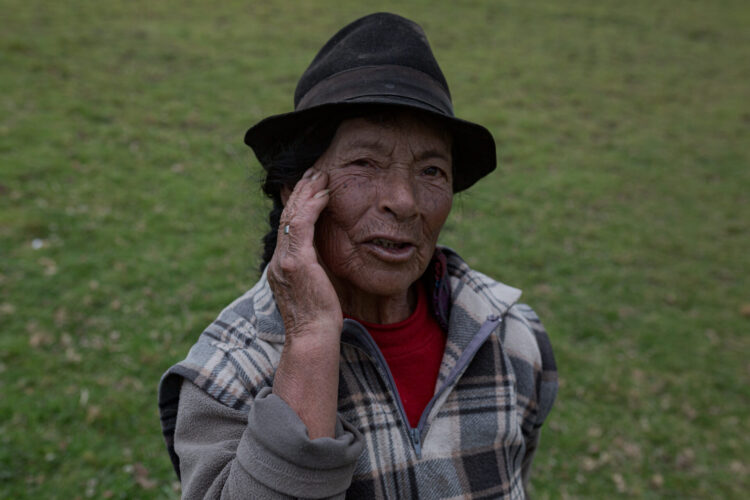
“For me, it is as if the pandemic did not exist,” she says, and laughs. “God is taking care of us.” Maria bore five children. One died at twenty four years old in a traffic accident. Her surviving children and grandchildren worry about her in these troubled times – and advise her not to venture out. But she is stubborn, and has her own free will. “I went to the marketplace during the quarantine. I just walked there. They took my temperature at the entrance, and then allowed me in. Every week or two I go and buy some things there. And look – nothing has happened to me. I have a facemask, you know, just in case,” Maria explains, and laughs loudly again. “My daughters try to prevent me going down to the centre. But as they are working, they don’t even know that I go there. “ Mother, don’t you dare go down there!” my children and grandchildren would say. But I am not afraid of the pandemic. It is just like the wind,” says the eighty three year old female farmer.
She starts off by herself, joking about the pandemic, and it’s causes: “Of course, you will catch diseases, when they walk around like they do, almost naked, even if it’s cold,” she says, referring to younger people’s fashion, “Bareing all that skin!” And she repeats her version of this airborne virus: “If it’s just the wind, why is everyone so scared?”
However, for the old lady, this time has been a depressing period. She recalls her visit down to town during the strictest part of the quarantine: “The city looked sad! It was sad. Like a ghost town, where everyone’s departed. As if all the people had passed away. It was very sad.” For once Maria’s face clouds over with a serious expression. “The people were all covered when they walked around. It is like life, without life”.
“That’s it, the story is over.” Maria’s last words hang there, blowing in the wind, high above the city of Quito, while she continues with her strong legs, uphill.
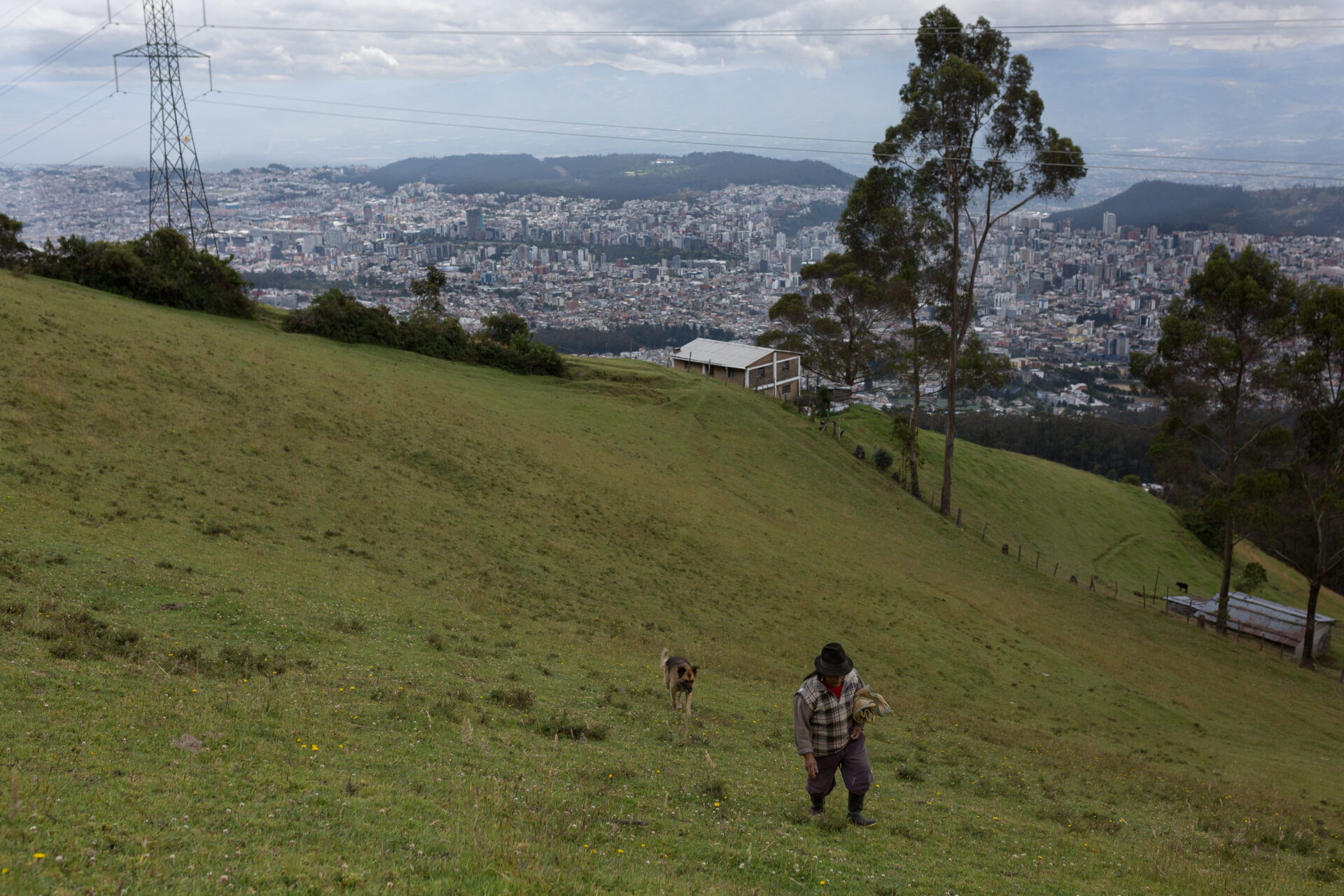
Photos by Andrés Yépez. Story by Lise Josefsen Hermann – a freelance journalist based in Latin America for more than a decade. She specializes in environmental issues and climate change, human rights, indigenous peoples, migration and more. She is a Pulitzer Grantee and her work has been published with media like Al Jazeera, BBC, Deutsche Welle, Danish Broadcasting Corporation, Danish Development Research Network, El Pais, New York Times, and Undark Magazine.
Also read: Older people in Denmark were mostly worried about other people getting infected with COVID-19 and COVID-19’s extra torture on Kenya’s elderly
SUPPORT DDRN SCIENCE JOURNALISM. DONATE DKK 20 OR MORE![]() (APPLICABLE IN DENMARK ONLY)
(APPLICABLE IN DENMARK ONLY)


